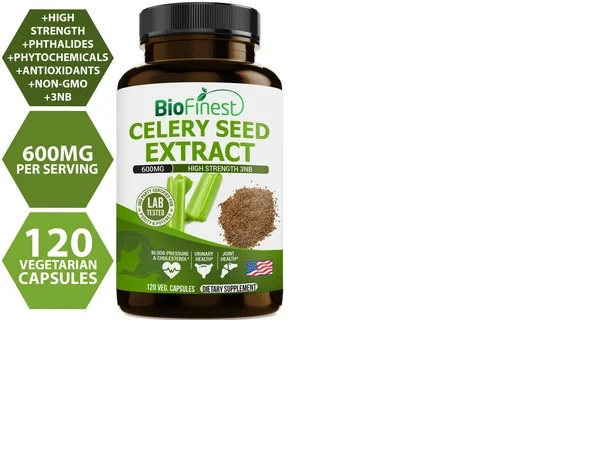Celery, scientifically known as Apium graveolens, is a crunchy, low-calorie vegetable that belongs to the Apiaceae family. Widely cultivated and consumed worldwide, celery is prized not only for its crisp texture and refreshing taste but also for its potential health benefits. In recent years, celery supplements have gained popularity as a convenient way to harness the nutritional properties of this versatile vegetable. In this comprehensive guide, we’ll explore the origins, nutritional composition, therapeutic applications, dosage recommendations, and safety considerations associated with celery supplements.
Understanding Celery
Origins and Traditional Use
Celery has a long history of culinary and medicinal use, dating back to ancient civilizations such as the Egyptians, Greeks, and Romans. The ancient Greeks and Romans used celery leaves as a garnish and celery seeds as a flavoring agent in various dishes. In traditional medicine systems such as Ayurveda and Traditional Chinese Medicine (TCM), celery has been valued for its diuretic, anti-inflammatory, and digestive properties.
Nutritional Composition
Celery is a nutrient-dense vegetable that is rich in vitamins, minerals, antioxidants, and dietary fiber. It contains vitamins A, K, C, and B vitamins (including folate and vitamin B6), as well as essential minerals such as potassium, calcium, and magnesium. Celery is also abundant in phytochemicals, including flavonoids, phenolic acids, and phytosterols, which contribute to its health-promoting properties.
Health Benefits of Celery Supplements
Anti-Inflammatory Effects
Celery contains bioactive compounds such as apigenin, luteolin, and polyacetylenes, which exhibit potent anti-inflammatory properties. These compounds help reduce inflammation in the body by inhibiting pro-inflammatory enzymes and cytokines. Celery supplements may be beneficial for individuals with inflammatory conditions such as arthritis, gout, and inflammatory bowel disease (IBD).
Heart Health
The antioxidants and phytochemicals found in celery have been shown to support cardiovascular health by reducing the risk of heart disease and stroke. Celery contains compounds like phthalides, which help lower blood pressure by relaxing the blood vessels and improving circulation. Additionally, celery’s high potassium content helps regulate blood pressure and maintain electrolyte balance.
Digestive Health
Celery is rich in dietary fiber, which supports digestive health by promoting regular bowel movements and preventing constipation. The fiber in celery also acts as a prebiotic, feeding beneficial bacteria in the gut and promoting a healthy microbiome. Celery supplements may aid in digestion, reduce bloating, and support overall gastrointestinal function.
Antioxidant Protection
Celery is packed with antioxidants, including vitamin C, flavonoids, and phenolic acids, which help neutralize harmful free radicals and protect cells from oxidative damage. Antioxidants play a crucial role in reducing the risk of chronic diseases such as cancer, diabetes, and neurodegenerative disorders. Regular consumption of celery supplements may contribute to overall health and longevity.
Weight Management
Celery is naturally low in calories and contains high water content, making it an excellent choice for weight management and hydration. The fiber in celery helps promote satiety and reduce hunger, making it easier to control calorie intake and maintain a healthy weight. Celery supplements may be incorporated into a balanced diet to support weight loss goals.
Dosage Recommendations
Capsules or Extracts
Celery supplements are available in various forms, including capsules, tablets, powders, and liquid extracts. Dosage recommendations may vary depending on the concentration of active compounds and the specific health goals of the individual. However, a typical dosage range for celery extract is 500-1000 milligrams per day. It is advisable to follow the dosage instructions provided on the product label or consult with a healthcare professional for personalized recommendations.
Safety Considerations
Generally Recognized as Safe
Celery supplements are generally considered safe for most individuals when taken at recommended doses. However, some people may be allergic to celery and may experience allergic reactions such as skin rashes, itching, or swelling. Individuals with a known allergy to celery should avoid celery supplements or consult with a healthcare professional before use.
Potential Interactions
Celery supplements may interact with certain medications or medical conditions. Individuals taking medications for blood pressure or blood thinning should exercise caution and consult with a healthcare professional before using celery supplements. Additionally, individuals with kidney problems or electrolyte imbalances should monitor their celery intake due to its high potassium content.
Conclusion
Celery supplements offer a myriad of potential health benefits, including anti-inflammatory effects, heart health support, digestive health promotion, antioxidant protection, and weight management support. With its nutrient-rich profile and diverse array of phytochemicals, celery continues to be recognized as a valuable addition to a healthy diet. By incorporating celery supplements into a balanced lifestyle, individuals can harness the nutritional properties of this versatile vegetable to support overall health and well-being. Always consult with a healthcare professional before starting any new supplement regimen.
- Benefits of Chickweed Supplements - March 30, 2024
- Benefits of Cramp Bark Supplements - March 30, 2024
- Benefits of Cantaury Supplements - March 21, 2024

